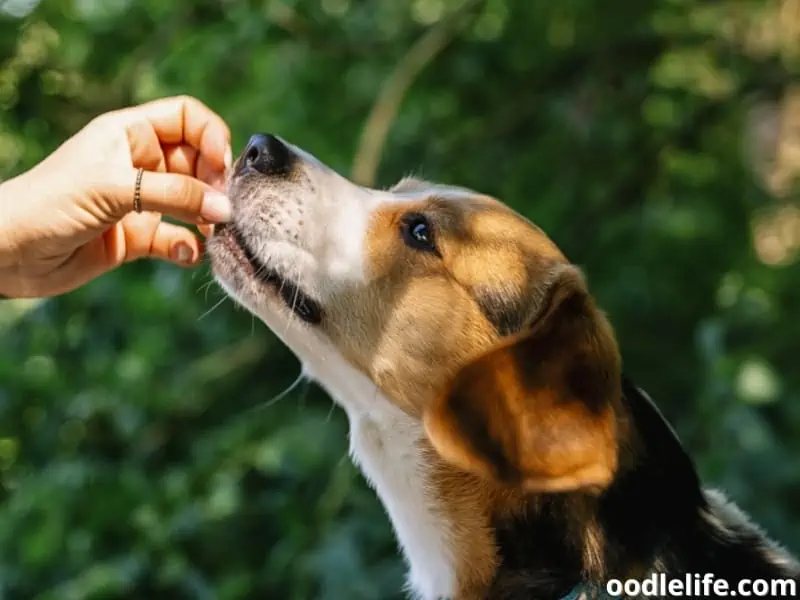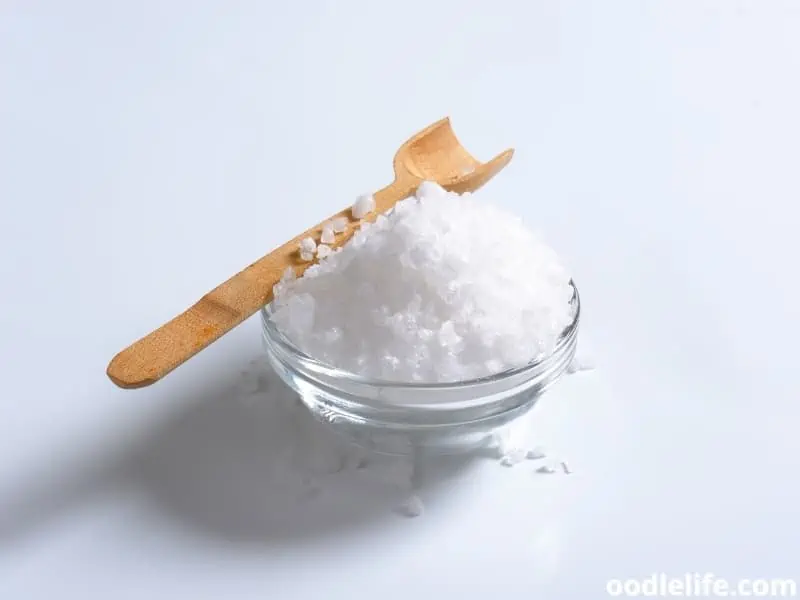Can Dogs Eat Salt and Vinegar Chips? [How BAD!?]
When your four-legged friend is begging for a bite of your snack, it can be tempting to give in to those puppy dog eyes.
While a little bit of “human food” is fine as an occasional treat, it’s not a good idea to let your pup indulge too often. Salty and sugary snacks can be particularly bad for your dog’s health.

When munching on a bag of chips, I’ve often wondered if it’s safe for my pet to do the same. Plenty of dog owners find themselves asking: can dogs eat salt and vinegar chips?
Can Dogs Eat Salt and Vinegar Chips?
While I love treating my dogs to their favorite table scraps, I want to be sure that what they’re eating is healthy.
Most of us are aware that chips aren’t the healthiest snacks. Even for humans, they contain harmful trans fats, high sodium levels, and minimal healthy nutrients. Like us, dogs should eat potato chips in moderation.
While one or two chips every once and a while won’t hurt, though, an excess may lead to health issues down the line.
Potato chips get fried in oils containing trans fats, which can cause obesity, diabetes, and cardiovascular disease in your pet. What’s more, feeding your dog potato chips will fill their belly without adding any nutritional value. A diet high in unhealthy carbs can eventually lead to serious nutrient deficiencies.
If you’re eating salt and vinegar chips, only feed them to your dog in small, infrequent amounts. You should also dispose of the bag somewhere to ensure your dog can’t get to it. Not only can they lick unhealthy salt and spices from the lining, but bags may pose a suffocation risk for smaller pets.

Are Potatoes Safe for Dogs?
In most cases, cooked potatoes are perfectly safe for dogs. They contain healthy nutrients such as vitamin C, potassium, and magnesium. In fact, many popular brands of dog foods use potatoes as a filler for kibble.
On the other hand, fried potatoes such as chips are not healthy. They are fried in oil containing unhealthy trans fats, which may put your pup at a higher risk of elevated cholesterol. While fried potatoes are not toxic for dogs, you should only offer them in moderation.
Never feed your dog green or raw potatoes, as these can be deadly. As a member of the nightshade family, they contain the poison solanine. In high enough concentrations, it can lead to issues ranging from digestive problems to paralysis and death.

Is Salt Safe for Dogs?
Salty chips contain high sodium levels, which can be unhealthy or even deadly for your dog.
A small amount of salt is unlikely to cause much harm, though it may lead to discomfort. Salt is even necessary to maintain healthy function in small amounts. Experts recommend dry food for dogs should contain at least 0.3% sodium per volume.
However, overly salty snacks can make dogs feel dehydrated. If you feed your dog even a small amount of chips, make sure you have plenty of water on hand in case they get thirsty.
Larger amounts of salt can lead to more serious short-term issues. It may cause digestive problems such as nausea, vomiting, and diarrhea. If your dog drinks more to cope with dehydration, you may notice excessive urination.
Regular salt consumption may result in long-term health problems for your pooch. Too much salt can lead to kidney damage, cardiovascular disease, and even salt poisoning. If you notice symptoms such as lethargy, depression, shortness of breath, or seizures, contact your vet straight away.

Is Vinegar Safe for Dogs?
Like salt, vinegar is fine for most dogs in small amounts. How well a dog tolerates vinegar can vary greatly between individuals and species.
For most dogs, the amount of vinegar found on a salt and vinegar chip is not enough to cause damage. In large volumes, however, vinegar may lead to gastrointestinal issues. Issues can range from nausea and vomiting to gas, diarrhea, and inflammation.
Dogs with sensitive stomachs or kidney disease may have more trouble processing vinegar than others. Some may even be allergic to vinegar. In these cases, ingestion can lead to issues such as itching, rashes, and even difficulty breathing.
If you’re not sure whether your dog is allergic to vinegar, a simple test will tell you if it’s safe. You can add a very small spoonful of vinegar to its regular food to see how it reacts. It’s best to use apple cider vinegar, as it’s gentler on the stomach than other types.
If your dog shows signs of discomfort after eating, such as gas or vomiting, vinegar likely doesn’t agree with their system. On the other hand, if your dog shows no change, they’re probably okay to eat salt and vinegar chips in moderation.
When in doubt, always speak to your vet before adding anything new to your dog’s diet. They can help you to come up with a safe and healthy meal plan, including appropriate snack options if necessary.

When Are Salt and Vinegar Chips Okay To Eat?
If you decide to feed your dog salt and vinegar chips, make sure that you only offer them in limited amounts. It’s a good idea to set a routine so that you avoid overtreating your pup.
When you sit down with a bag of salt and vinegar chips, make it clear that your dog only gets one. Otherwise, you may lose track of just how much salt and vinegar your pup ingests.
If you set this expectation, your dog is less likely to beg for more treats. It sets a healthy boundary for both of you during feeding time and helps you to moderate your dog’s treat intake.
Don’t forget that training can come into play when offering your dog human foods. Be firm in your commands when you tell them to stop begging or back away. If you drop food on the floor, you should have a clear “release” command so that your dog doesn’t hoover up anything too unhealthy.
If your dog is having trouble with temptation, you may want to have a snack substitute for them when eating. Have a bag of dog-friendly treats on hand so that when they beg, you can give them something with substance.

In Conclusion
If you’re anything like me, you’ve probably wondered: can dogs eat salt and vinegar chips?
The next time that you’re enjoying a bag of salt and vinegar chips, it’s best to hold off treating your dog to a bite. While chips are okay in moderation, too many can lead to both short and long-term health issues.
(Don’t forget to be cautious with dips and salsa around dogs as well)